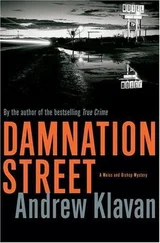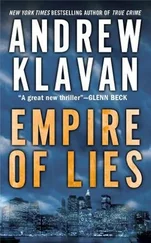Andrew Klavan - True Crime
Здесь есть возможность читать онлайн «Andrew Klavan - True Crime» весь текст электронной книги совершенно бесплатно (целиком полную версию без сокращений). В некоторых случаях можно слушать аудио, скачать через торрент в формате fb2 и присутствует краткое содержание. Жанр: Криминальный детектив, на английском языке. Описание произведения, (предисловие) а так же отзывы посетителей доступны на портале библиотеки ЛибКат.
- Название:True Crime
- Автор:
- Жанр:
- Год:неизвестен
- ISBN:нет данных
- Рейтинг книги:4 / 5. Голосов: 1
-
Избранное:Добавить в избранное
- Отзывы:
-
Ваша оценка:
- 80
- 1
- 2
- 3
- 4
- 5
True Crime: краткое содержание, описание и аннотация
Предлагаем к чтению аннотацию, описание, краткое содержание или предисловие (зависит от того, что написал сам автор книги «True Crime»). Если вы не нашли необходимую информацию о книге — напишите в комментариях, мы постараемся отыскать её.
True Crime — читать онлайн бесплатно полную книгу (весь текст) целиком
Ниже представлен текст книги, разбитый по страницам. Система сохранения места последней прочитанной страницы, позволяет с удобством читать онлайн бесплатно книгу «True Crime», без необходимости каждый раз заново искать на чём Вы остановились. Поставьте закладку, и сможете в любой момент перейти на страницу, на которой закончили чтение.
Интервал:
Закладка:
About six weeks after the election, one of these same ministers took to his pulpit to announce in tones of thunderous regret that he had come into possession of disheartening news. Charges had been made, he said, that a certain neighborhood servant of God had strayed from the path of righteousness so far as to misappropriate church funds for his own uses, patronize various local establishments of sin and abuse the trust of at least one young girl who had come to him for spiritual guidance. The young girl was produced, the press was alerted and investigators from both the city and the state were dispatched with what some might have felt was remarkable alacrity. The Reverend Harlan Flowers was in deep, deep trouble.
The scandal that followed was not the less painful and debilitating to Flowers for the fact that he was guiltless. The sight of his name in the newspapers linked to financial boondoggles he hadn’t the nature to devise and sexual improprieties he hadn’t even the inclination to commit, was like a stone gargoyle perched atop his heart devouring the inner substance of it day after miserable day. There were nights during that period when Flowers fell on his knees and begged his God to kill him as a mercy. There were mornings when he awoke made almost faithless by the fact that his prayers had gone unheeded and his consciousness had been allowed to return.
He was saved the disaster of an indictment finally by our froggy friend Cecilia Nussbaum. The circuit attorney soon got wise to the real nature of the charges and not only called off the local dogs but journeyed to Jefferson City where many a political buttock was made to resemble a football field after a particularly rainy Sunday. As for the reporters, after about the fifth time Flowers told them that he had been rigorously faithful to his wife for all seventeen years of their marriage, it finally occurred to them that this was a pretty original defense for a public figure. In fact, they began to feel it was so preposterous it might just be true. And the moment the sex charges evaporated, the financial peccadilloes that had been discovered in the church books appeared miraculously to be exactly what they were: the result of Flowers’s sloppy and indifferent accounting procedures. With a few self-examining editorials to cover their retreat, the media withdrew.
It was a full year before Flowers reestablished himself in the Florissant ministry where Bonnie Beachum found him. Here, his congregation steadily grew, and the functionaries of both political parties, wary of tangling with La Nussbaum again, resolved to gather their votes elsewhere.
But if the scandal did no permanent damage to his career, it had a profound and lasting effect on his personality. In his old parish in the south city, he had been a fierce and crusading activist, a fighter against local drug lords, a gadfly to the mayor and a frequent face on local news programs as he badgered the state and city governments for money and programs to help the slums. In the north, after the scandal, he turned his attention away from these big issues, and it was said by some that he had lost heart for the fight. He became the grave and quiet figure Bonnie knew. When he was away from his church, he spent his time visiting hospitals and clinics; he presided at funerals and comforted the mourning; and he made incessant calls at those prisons where sundry sons and husbands of his congregation had come to reside. He stopped declaiming against the evils of crime and poverty and abandoned his guerrilla war against the injustices of society as a whole. In fact, he seemed to have lost his taste for making moral judgments altogether and concentrated his attention on reminding anyone who would listen that God cared for the least of their troubles as he did for the farthing sparrows. The media, of course, lost interest in him completely. And so, for the most part, if he gained the support and affection of his little church, he dropped from the larger public’s view.
All of which I mention only to explain his attitude toward Frank Beachum’s innocence. That is, he had none. He never thought about it-or if he did, they were idle thoughts, and he attached no importance to them. He had come to care for Frank quite a lot-and for Bonnie too, though he sensed that he-that black people-made her uncomfortable. He hoped Frank wasn’t going to have to answer to God for murdering Amy Wilson but, in the end, he felt that was between Frank and God. His job, Flowers’s job, he felt, was to help Bonnie and Gail within the small range of his abilities, and to make sure that Frank didn’t go to his death without human solace, alone.
To that latter end, he entered the Deathwatch cell at five minutes to ten o’clock for his last visit with Frank before the execution. He saw at once that the prisoner was in a bad way. Frank was sitting on the edge of his cot, hunched over, staring at the floor, rubbing his hands together between his knees. His mouth was working, his face was sallow and his eyes were unnaturally bright. The sight of him came as a small shock to Flowers, who had last seen him when he had come to collect Gail. Then, the prisoner had seemed grief-struck, but straight, composed, inwardly strong. Now, there was nothing radiating from that bent and twisted figure but panic and wretchedness and fear. The preacher guessed what had happened right away: Frank had put all his will into a show of strength for Bonnie and the child; and now that they were gone, he was suffering the inevitable reaction.
Beachum jumped when the bars slid back: he hadn’t heard Flowers come into the cell. Startled from his reverie, his eyes flashed to the clock at once and then he swallowed and breathed again: no, not yet; it wasn’t time yet.
As Benson shut the cage again, Flowers moved to the cot and stood over the condemned man. Beachum ran his fingers up through his hair and Flowers saw that his hair was damp with sweat.
“Getting late, huh?” Frank said with a nervous laugh-and he glanced up as if hoping Flowers would contradict him. He looked away again. “Yeah. Late. Yeah.”
Looking down at the bowed head, the lank hair, the reverend felt a terrible weary sorrow for Frank. For Bonnie too and for the little girl. For all of them: a terrible burden of pity. But then he felt that so often these days-pity, sorrow-and felt it for so many different people that it was less an emotion of the moment than an unshifting point of view, a filter over his vision. He even felt sorrow at his own sense of gratitude and vitality: the surge of petty pleasure he felt standing there that he was not Frank, that he was not scheduled to die at midnight. Like the second titmouse on a branch when a hawk swoops down and carries off his brother, he was thinking: God is good, God has been good today. Flowers felt pity for himself that he was as small and miserable a thing as that.
“Getting bad for you, is it, Frank?” he said.
“Bad! Yeah, bad, it’s bad!” And with that, Beachum shot off the cot, paced quickly to the cage bars and back. During that short journey, he went through a whole catalogue of nervous gestures: running his fingers through his hair, rubbing his hands together, wiping his mouth, casting his eyes at the clock and away and at the clock again. As he neared the cot, he pulled up short, staring at Flowers with those bright eyes as if he had just noticed the reverend standing there for the first time. “I mean, I didn’t do anything,” he said. “I swear it to God, Harlan. I didn’t …” He spun back to the bars, stepped to them, clutched them weakly with his two hands and bowed his head. “I’m sorry,” he said. “I’m sorry. I’m not doing too well here.”
Flowers walked up behind him, put his hand on Frank’s shoulder. “It’s an awful thing to face.”
Читать дальшеИнтервал:
Закладка:
Похожие книги на «True Crime»
Представляем Вашему вниманию похожие книги на «True Crime» списком для выбора. Мы отобрали схожую по названию и смыслу литературу в надежде предоставить читателям больше вариантов отыскать новые, интересные, ещё непрочитанные произведения.
Обсуждение, отзывы о книге «True Crime» и просто собственные мнения читателей. Оставьте ваши комментарии, напишите, что Вы думаете о произведении, его смысле или главных героях. Укажите что конкретно понравилось, а что нет, и почему Вы так считаете.












